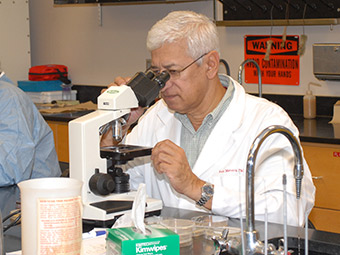Document Type
Article
Publication Date
1-17-2023
Abstract
Plants possess physical and chemical defenses which have been found to deter herbivores that feed and oviposit on them. Despite having wide variety of defenses which can be constitutive or induced, plants are attacked and damaged by insects associated with different mouthparts and feeding habits. Since these defenses are costly, trade-offs for growth and defense traits play an important role in warding off the herbivores, with consequences for plant and herbivore growth, development and fitness. Solanum is a diverse and rich genus comprising of over 1,500 species with economic and ecological importance. Although a large number of studies on Solanum species with different herbivores have been carried out to understand plant defenses and herbivore counter defenses, they have primarily focused on pairwise interactions, and a few species of economic and ecological importance. Therefore, a detailed and updated understanding of the integrated defense system (sum of total defenses and trade-offs) is still lacking. Through this review, we take a closer look at the most common plant defense hypotheses, their assumptions and trade-offs and also a comprehensive evaluation of studies that use the genus Solanum as their host plant, and their generalist and specialist herbivores from different feeding guilds. Overall, review emphasizes on using ubiquitous Solanum genus and working toward building an integrated model which can predict defense-fitness-trade-offs in various systems with maximum accuracy and minimum deviations from realistic results.
Recommended Citation
Watts, Sakshi, Satinderpal Kaur, and Rupesh Kariyat. "Revisiting plant defense-fitness trade-off hypotheses using Solanum as a model genus." Frontiers in Ecology and Evolution 10 (2023): 1094961. http://doi.org/10.3389/fevo.2022.1094961
Creative Commons License

This work is licensed under a Creative Commons Attribution 4.0 International License.
Publication Title
Frontiers in Ecology and Evolution
DOI
10.3389/fevo.2022.1094961



Comments
© 2023 Watts, Kaur and Kariyat.